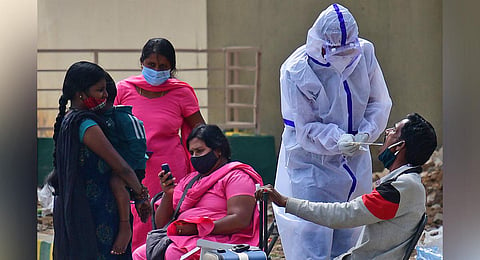

BENGALURU: A study that traced the spread of Covid-19 in Karnataka between March 8 and May 21 found 91 genomes of SARS-CoV-2 clustered into seven lineages. A paper, ‘Genomic epidemiology reveals multiple introductions and spread of SARS-CoV-2 in the Indian state of Karnataka’, used a combination of contact tracing and genomic epidemiology to trace the spread of the disease in the state and found that the lineages identified here are known to have originated in China, South East Asia, Iran, Europe and other parts of India, and brought into the state either by international or domestic travel. Between March 5 and May 21, the state had 1,578 cases.
“The data from this study provides evidence for multiple introductions of the virus into the state with sustained local transmission. Our sequences grouped into 17 contact clusters and 24 cases with no known contacts. This is the first study from India combining genomic data with epidemiological information emphasising the need for an integrated approach to outbreak response,” an excerpt read.
Dr Prakash Kumar, joint director for communicable diseases at Health and Family Welfare Department and one of the authors of the paper, said the study indicated cluster transmission and is helpful from an epidemiological perspective in planning prevention strategies through quarantine and physical distancing. “The study shows that the virus is still spreading through contact, resulting in clusters. Preventing clusters is the way to prevent the spread of a pandemic,” he said.
The study found the contact clusters to be in Mysuru, Belagavi, Bengaluru Urban, Mandya, Kalaburagi, Vijayapura, Bidar, Bagalkot, Uttara Kannada, Davanagere and other places.“Within the study period, there was an early ban of international passenger travel. Our data suggests that the tracing and containing of these cases was effective. A nationwide closure of air and rail routes followed.
This, however, seems to have been incompletely effective in preventing importation of cases due to domestic travel. In spite of nationwide lockdowns and quarantining of migrant workers, cases continued to be imported into Karnataka... These observations are consistent with widespread circulation of the virus in some states of the country. They emphasise the need for screening and quarantining of travellers as restrictions are relaxed, in addition to the follow up of ongoing transmission in the state,” the study said.
Epidemiologist and member of the state’s Technical Expert Committee Dr Giridhar R Babu, welcomed the study, but said, “It gives the genetic sequencing of the infection up to May. After this, we are not aware of how the genetic sequencing of the virus has changed, or if it has changed at all, as no studies were done. The government is planning to conduct another study.”